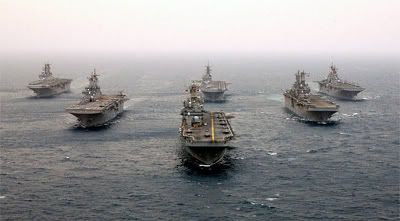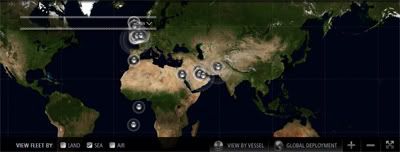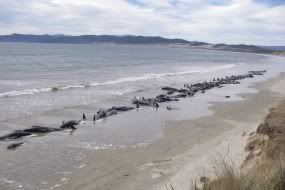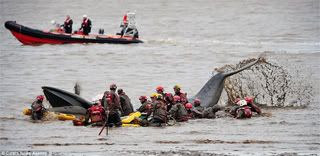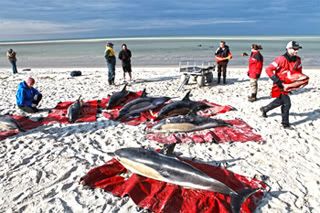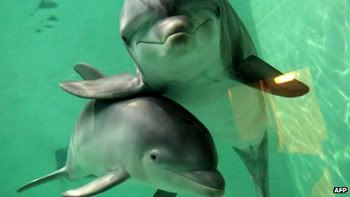
photo credit AFP
Further to my previous Twitter post about dolphins making the front page in The Metro, I thought I'd write a bit about the growing topic of cetacean intelligence and their proposed rights.
You've probably heard about the recent People for the Ethical Treatment of Animals (PETA) case suing SeaWorld for enslaving its killer whales in their well-known marine amusement parks. Call it genius or call it crazy - this was still the first case that considered giving constitutional rights to a species other than humans. U.S. District Judge Jeffrey Miller ultimately decided to dismiss the case, however he was also the first judge to actually consider it. Despite the dismissal, legal experts are saying the case has opened the debate on the possibilities of increasing the rights of animals.
SeaWorld's main argument was that orcas are not persons, and are therefore not eligible for protection. Said SeaWorld's attorney, Theodore Shaw:
"Neither orcas nor any other animal were included in the 'We the people' ... when the Constitution was adopted."
PETA's attorney, Jeffrey Kerr, argued that the exclusion of these "living, breathing, feeling beings" from "personhood" and defining them as property was the same argument used to justify denying the rights of slaves and women.
"Slavery doesn’t depend upon the species of the slave, any more than it depends upon the race, gender or ethnicity of the slave. SeaWorld’s attempts to deny [orcas] the protection solely based on their species is the same kind of prejudice used to justify any enslavement. And prejudice should not be what determines constitutional rights in this country...Today's decision does not change the fact that the orcas who once lived naturally wild and free, are today kept as slaves by SeaWorld."
Now, I think we're all aware of some of the things that are said about PETA, and honestly...they're not my favourite. But this lawsuit - however much they may or may not have anticipated its dismissal - still did bring up a good point: Should the antiquated practise of keeping animals in captivity for human entertainment still be continued, simply based on the fact that they are not people?
PETA's lawsuit did miss a few notes, good as its intentions were. It failed to establish the whales as "persons", and therefore was not able to argue that they deserved the same protection as humans. Said president of the Nonhuman Rights Project, Stephen Wise:
"We hope PETA will realize that it embarked on a fool’s errand. PETA wrongly believed it did not need to prove that an orca was a legal person, so it failed to be ready to prove that an orca is a ‘person.’ Worse, it actually opposed our legal arguments that an orca is indeed a ‘person’, thus creating a roadblock that we will have to overcome in the future."
The legal definition of a "person" (in short) is an "unspecified individual." Law professor Rebecca J. Huss proposes that "If we can establish corporations as persons, why can’t we establish whales as persons?"
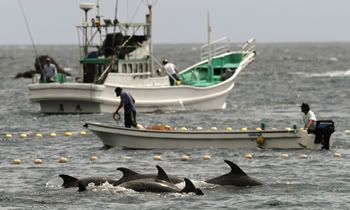
photo credit Kyodo News & AP
Experts across several related fields agree that the cetacean brain is extremely intelligent and that the animals are self-aware and able to think in abstract terms.
"When you get up in the morning and look in the mirror and know that's you, you have a sense of 'you'. They have a similar sense. They can look in a mirror and say, 'Hey, that's me'," explains psychologist Dr Lori Marino of Emory University.
Whales and dolphins also have their own cultures, and are known to pass information such as feeding areas or methods of capturing prey down from generation to generation. This cultural knowledge differs between local populations of a species, illustrating how different groups of individuals will learn to adapt to challenges in their respective environments. Many cetacean species have strong family or social groups and some will remain with their pod for the duration of their lives.
In captivity, a whale or dolphin is not able to behave in its natural ways, and will suffer in the same way a human does in prison. This unnatural - often violent - separation from one's home, family group and way of life is inherently cruel no matter what the species. When we consider the continued practise of whaling by some nations, it cuts a level deeper.
"The science has shown that individuality - consciousness, self-awareness - is no longer a unique human property. That poses all kinds of challenges," say ethics expert Prof Tom White from Loyola Marymount University.
Recently, four former SeaWorld trainers have come together to create a site for the killer whales housed at SeaWorld and to let the public see what really goes on. Called "Voice of the Orcas", the site was created after the four had a change of heart and decided to fight for the whales' rights and wellbeing rather than participate in their captivity.
Earlier this month, Voice of the Orcas released photos which they say show "the true costs of caring for captive cetaceans." Breeding programs through manual masturbation and artificial insemination, tooth loss due do biting down on metal and concrete elements of the tanks, ulcers from stress, and dorsal fin collapse - all conditions that you would rarely or NEVER find in wild orcas.

photo credits Voice of the Orcas
Certainly, if our fellow humans were subjected to these kinds of conditions there would be an outrage - and rightly so. But what about these "non-human persons"? Should it make any difference that a species with similar intellect was born into a different body?
"We’ve shown that qualities that make humans persons are shared with other animals," said Marino. "(They) shouldn’t be treated like property or objects — shouldn’t be confined, captured, slaughtered or exploited and all the things we still do to dolphins and whales," says Marino.
Last weekend the American Association for the Advancement of Science (AAAS) met in Vancouver, Canada, where a group of experts in philosophy, conservation and animal behaviour presented the "Declaration of Rights for Cetaceans." Granting cetaceans rights would mean an end to whaling, the captivity of dolphins and whales and their use in entertainment.
The document resolutely declares "Every individual cetacean has the right to life...No cetacean should be held in captivity or servitude, be subject to cruel treatment, or be removed from their natural environment", and "no cetacean is the property of any state, corporation, human group or individual."
"The next step is taking the science and advocating for law in different places, from a regional point of view, from a national point of view, and eventually from a multinational and international view," said Chris Butler-Stroud of the Whale and Dolphin Conservation Society.
The declaration is not expected to move quickly. There's a cozy spot on the back burner typically reserved for environmental and animal rights issues, while the rest of humanity likes to debate which presidential candidate is the craziest, or how much leg celebrities should show at awards ceremonies. The door is open, though, and cetacean rights will be a thing we will hear about with repeated frequency in the coming years.
What do you think?
